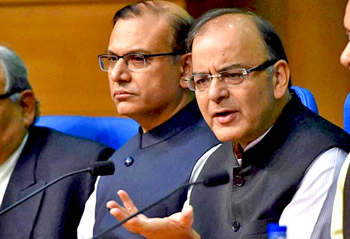New Delhi, May 22: Finance Minister Arun Jaitley said on Friday the approach to governance in India has seen a complete transformation in the past year, not just with decisiveness but also in terms of speed, clarity and transparency, that has earned the country global respect.

"Decisiveness even in the face of obstructionism has been the hall mark of the Modi government," he said, adding: "There is also absolute clarity in the direction in which the government ought to go, and that direction is towards growth and development."
He specifically said some fast and far-reaching decisions were were taken in a transparent manner in areas like railways, power, coal, mining, rural roads, telecom, highways, urban development, financial services, subsidies and petroleum, and these have left a mark for future growth.
"A key feature of this government has been a corruption-free administration, decision-making and transparent mechanisms and to take decisions without discrepancies," he said adding that all this had led, among other things, to India's business confidence index moving up.
"We are today the fastest growing economy in the world. But that is not enough for us," he said, adding that the public at large now was able to even ask: "Why arent we growing faster that the 8 percent, and this restlessness to grow faster is the real potential of India." He added: "Our decisions are as fast as this restlessness."





Comments
Add new comment